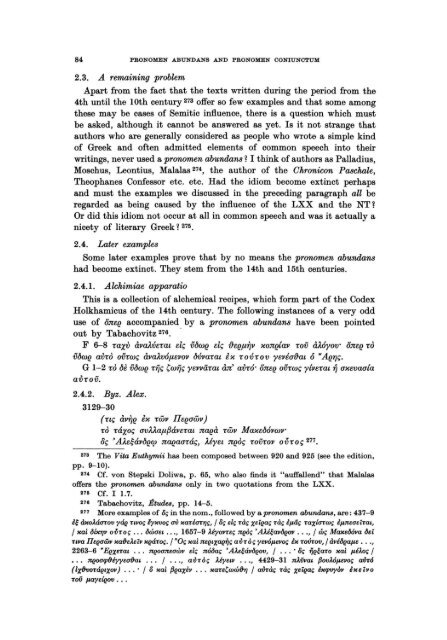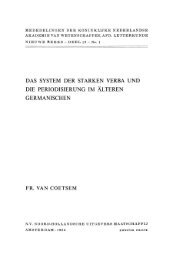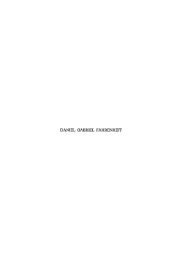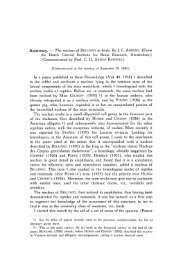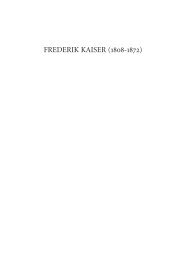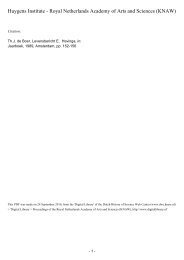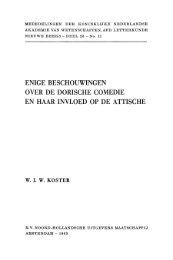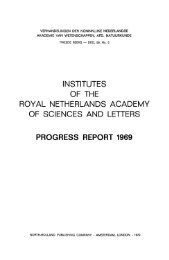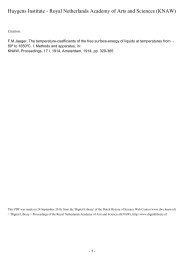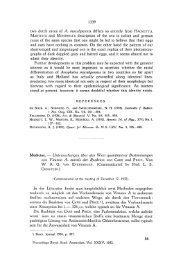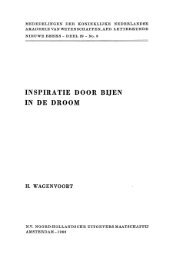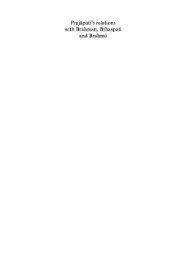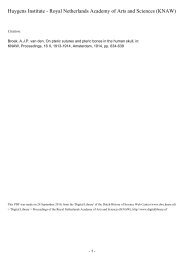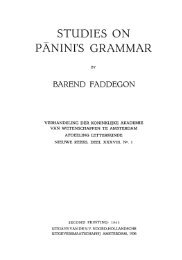Pronomen Abundans and Pronomen Coniunctum. A ... - DWC
Pronomen Abundans and Pronomen Coniunctum. A ... - DWC
Pronomen Abundans and Pronomen Coniunctum. A ... - DWC
Create successful ePaper yourself
Turn your PDF publications into a flip-book with our unique Google optimized e-Paper software.
84 PRONOMEN ABUNDANS AND PRONOMEN CONIUNCTUM<br />
2.3. A remaining problem<br />
Apart from the fact that the texts written during the period from the<br />
4th until the IOth century 273 offer so few examples <strong>and</strong> that some among<br />
these may be cases of Semitic influence, there is a question which must<br />
be asked, although it cannot be answered as yet. Is it not strange that<br />
authors who are generally considered as people who wrote a simple kind<br />
of Greek <strong>and</strong> of ten admitted elements of common speech into their<br />
writings, never used a pronomen abundans ~ I think of authors as Palladius,<br />
Moschus, Leontius, Malalas 274, the author of the Ghronicon Paschale,<br />
Theophanes Confessor etc. etc. Had the idiom become extinct perhaps<br />
<strong>and</strong> must the examples we discussed in the preceding paragraph all be<br />
regarded as being caused by the influence of the LXX <strong>and</strong> the NT ~<br />
Or did this idiom not occur at all in common speech <strong>and</strong> was it actually a<br />
nicety of literary Greek ~ 275.<br />
2.4. Later examples<br />
Some later examples prove that by no means the pronomen abundans<br />
had become extinct. They stem from the 14th <strong>and</strong> 15th centuries.<br />
2.4.1. Alchimiae apparatio<br />
This is a collection of alchemical recipes, which form part of the Codex<br />
Holkhamicus of the 14th century. The following instances of a very odd<br />
use of Snee accompanied by a pronomen abundans have been pointed<br />
out by Tabachovitz 276. '<br />
F 6-8 Taxv àvaÄ:ve-rat eiç f5t5we elç -&eel-'~V xone{av TOV àMyov' Snee Tà<br />
f5t5we aVTà oVTWÇ àvaAV61-'evov t5Vva-rat È'X TOVTOV yevÉIJ-&at Ó "Ae1Jç.<br />
G 1-2 Tà t5i f5t5we TijÇ Cwijç yevviiTat àn' aVT6' Snee OVTWÇ y{ve-rat 'Ii IJ'XevaIJ{a<br />
aVTov.<br />
2.4.2. Byz. Alex.<br />
3129-30<br />
(nç à~e È'X TWV IIeeIJwv)<br />
\, n {3 , \ - ~I ~ ,<br />
1'0 Taxoç IJvAI'oal-' aveTat naea TWV ma'Xeuovwv'<br />
öç 'AAe~ávt5eqJ naeaIJTáç, Uyet n(!àç TOVTOV OVTOÇ 277.<br />
-----<br />
278 The Vita Euthymii has been composed between 920 <strong>and</strong> 925 (see the edition,<br />
pp. 9-10).<br />
274 Cf. von Stepski Doliwa, p. 65, who also finds it "auffallend" that Malalas<br />
offers the pronomen abundam only in two quotations from the LXX.<br />
276 Cf. I 1.7.<br />
278 Tabachovitz, Études, pp. 14-5.<br />
277 More examples of oç in the nom., followed by a pronomen abundam, are: 437- 9<br />
iE dxo)'áOTOV yde 'nvoç ly)evor; uV )eaTéOT1'Jç, / oç elç Tdç XEÏ(laç Tdç i/Aáç TaX{OTwç i,.mUJEÏTa"<br />
/ )eall5"'1JV OUTOÇ • • • I5wUE' •.., 1657-9 UyOVTEÇ n(loç • AUEavl5(lov •••, / cór; MQ)eEl5óva l5ei<br />
nva IIE(luóYv )ealhkiv )e(láTOÇ. / ·Or; )eal nE(l,xCJ(!'Yjr; aUTOr; YEVÓ/AEVOr; èx ToVrov, / dvél5(la/AE •..,<br />
2263-6 W E(lxaa, .. • n(lounEudJv elç nól5aç • AkEávl5(lov, / .. • • or; 17(lEaTO )eal /Aé).or; /<br />
••. neourpf}éyyEufhn .. . / ..., aUTOr; ).éyuv ..•, 4429-31 n).Vva, POV).ó/AEVOr; a1ÏTó<br />
(lzli'vo'rde'xov) . • .. / 0 )eal p(laxEv ... )eaTE1;,wwlhJ / a1ÏTàr; Tdr; XEÏ(lar; èxrpvydv i)eE ivo<br />
TOO /AayEl(lov .•.


